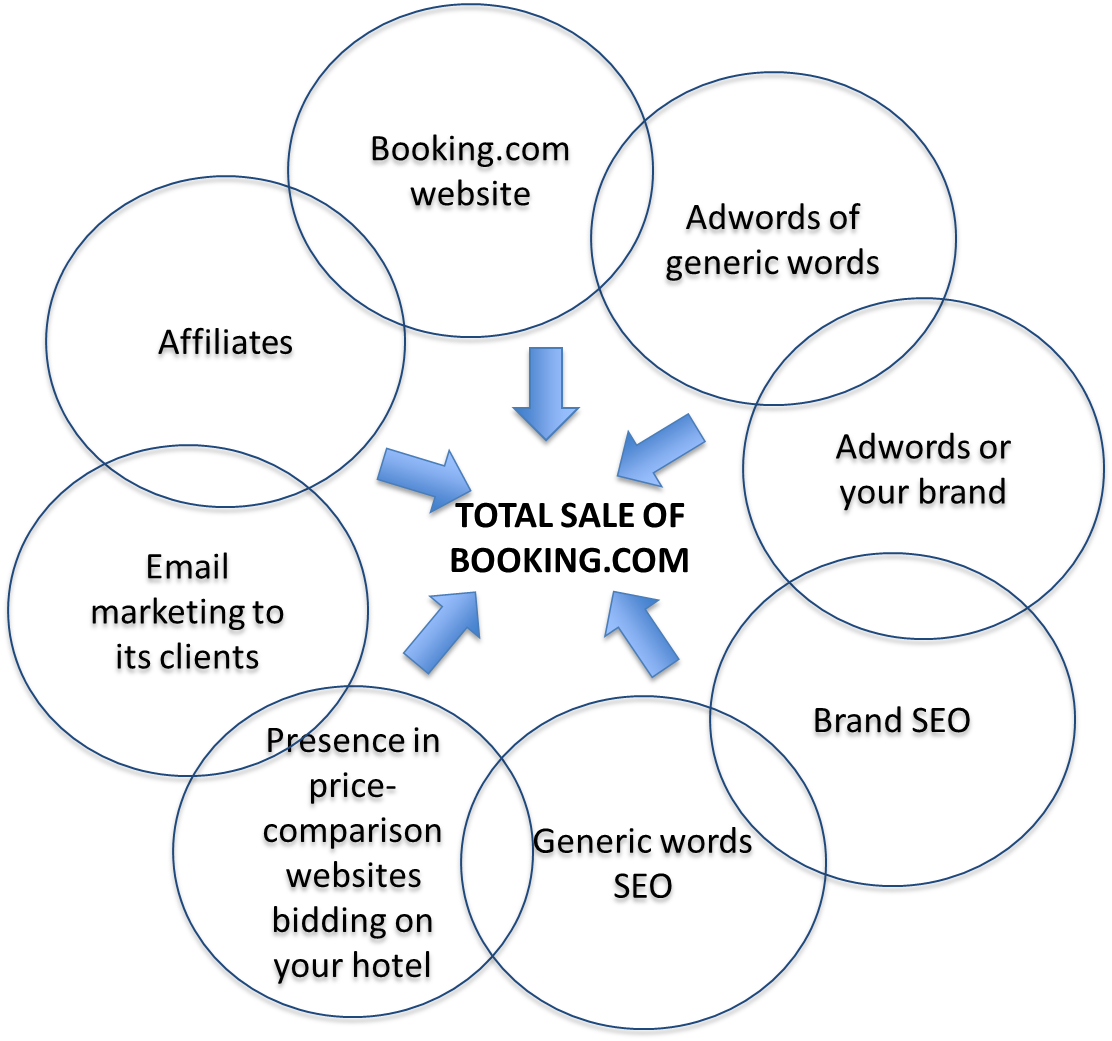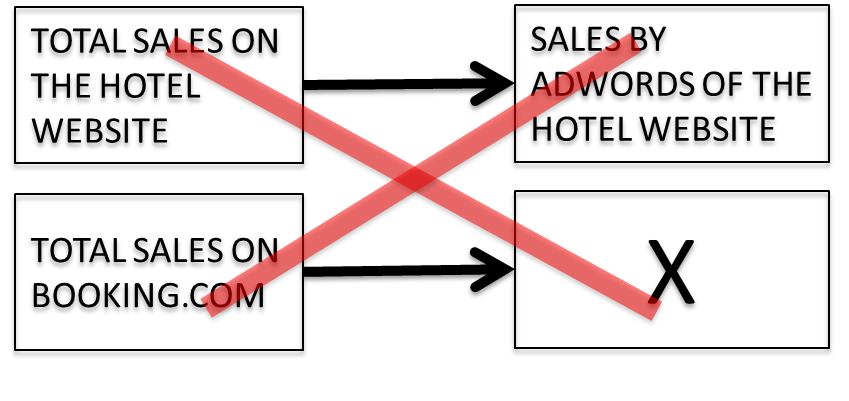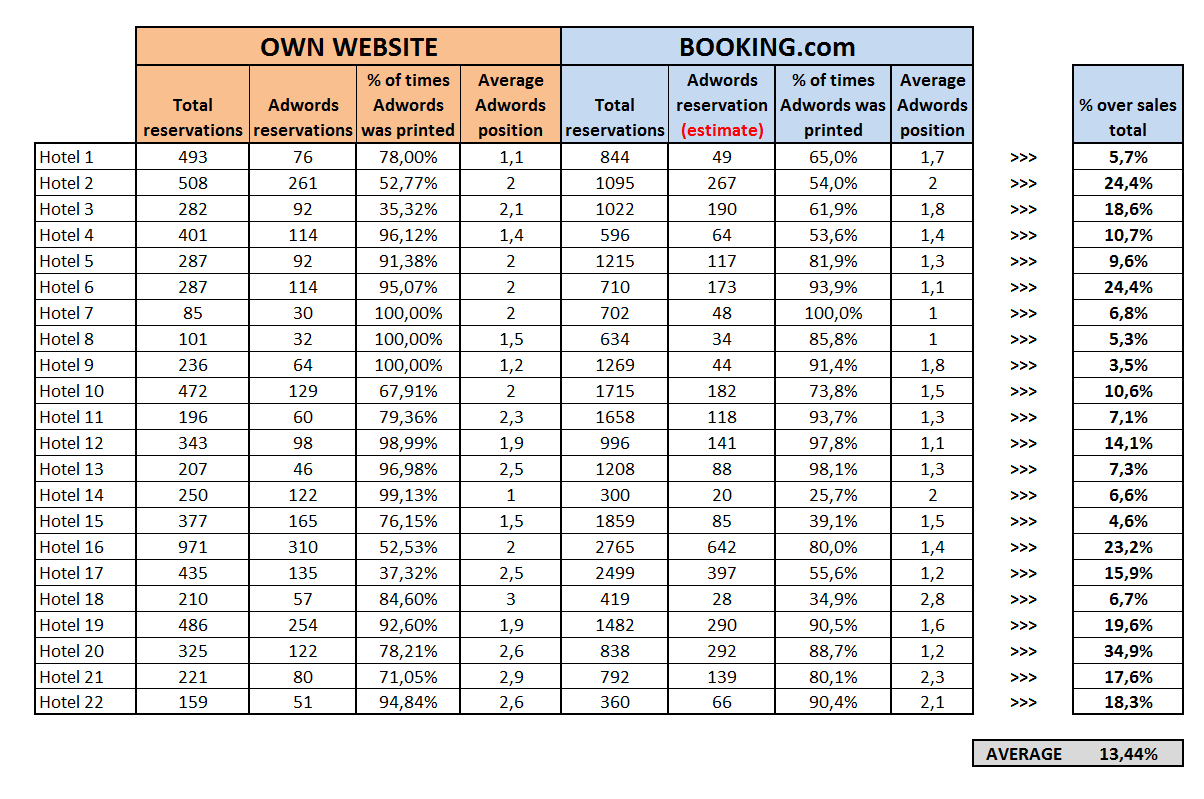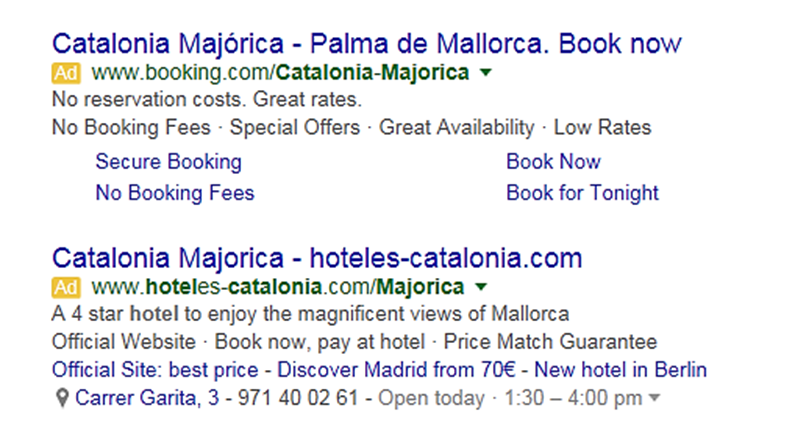The potential sales sources of Booking.com may be classified in the following way:
 Not all of these booking origins are new sales for your hotel. Some of them just compete with other channels (including your own website) for the same clients (existing sale), thus unnecessarily increasing your distribution costs. On this post, we will focus on one of the most controversial sales origins carried out by all OTAs, which offers no value at all and that you should demand to be removed: the AdWords of your brand.
Not all of these booking origins are new sales for your hotel. Some of them just compete with other channels (including your own website) for the same clients (existing sale), thus unnecessarily increasing your distribution costs. On this post, we will focus on one of the most controversial sales origins carried out by all OTAs, which offers no value at all and that you should demand to be removed: the AdWords of your brand.  However, how many sales do these AdWords represent over the total sales generated by Booking.com?
However, how many sales do these AdWords represent over the total sales generated by Booking.com?  The simplest thing would be to ask your Booking.com account manager. If he/she gives you the information (and compares it with transparent data), then that is great. You now have all the information you need to make the decisions that you deem necessary. On the other hand, this is information that they usually don’t share, information that account managers do not know of and that is managed on a different level. Without having the official numbers, at Mirai we have estimated it. We have strategically chosen 22 hotels that we work with that:
The simplest thing would be to ask your Booking.com account manager. If he/she gives you the information (and compares it with transparent data), then that is great. You now have all the information you need to make the decisions that you deem necessary. On the other hand, this is information that they usually don’t share, information that account managers do not know of and that is managed on a different level. Without having the official numbers, at Mirai we have estimated it. We have strategically chosen 22 hotels that we work with that:
- Are preferred hotels in Booking.com.
- Have a good reputation and positioning in their destination
- Are strongly investing in AdWords in order to sell more on their own website.
Conclusion
 According to our estimate, almost 15% of the total sales of Booking.com come from the AdWords with the hotels’ name/brand. This information varies considerably among hotels, with some of them standing at just 5% and others close to 35%. These differences are understandable, since we are calculating the weight that AdWords have over the sales totals, a quantity that varies a lot among hotels. For example, if you are a preferred hotel or are overriding commission, you increase your total sales on Booking.com without affecting the AdWords sales, which results in the weight of AdWords to increase or decrease.
According to our estimate, almost 15% of the total sales of Booking.com come from the AdWords with the hotels’ name/brand. This information varies considerably among hotels, with some of them standing at just 5% and others close to 35%. These differences are understandable, since we are calculating the weight that AdWords have over the sales totals, a quantity that varies a lot among hotels. For example, if you are a preferred hotel or are overriding commission, you increase your total sales on Booking.com without affecting the AdWords sales, which results in the weight of AdWords to increase or decrease.
Analysis
We have focused on the first trimester of the year: January-March 2016. Out of the 22 hotels we analysed, we obtained the following information:
- Number of bookings that came through their own website
- Out of these bookings, how many were generated by the AdWords made by the hotel.
- The total number of bookings that came in through Booking.com (information provided by the hotel itself).
Estimating that the weight of AdWords of website sales is proportional to the weight of AdWords of Booking.com sales is wrong.  The reason is that the total sales on Booking.com has more origins than the sales on the hotel website, such as the affiliation network, the SEO and SEM of generic words and the Booking.com traffic itself. Therefore, the weight of AdWords over the total of website sales is much higher than the same number on Booking.com.
The reason is that the total sales on Booking.com has more origins than the sales on the hotel website, such as the affiliation network, the SEO and SEM of generic words and the Booking.com traffic itself. Therefore, the weight of AdWords over the total of website sales is much higher than the same number on Booking.com.
Estimate
Using information provided by Google AdWords on its console, out of the 22 analysed hotels we have extracted the following information:
- The percentage of impressions on the hotel AdWords.
- This same number of Booking.com (provided also by Google).
- The average position of the website in the results.
- This same number of the Booking.com AdWords.
In this example, we can see that the Booking.com advert appeared 80% of the time with an average position of 1.4, while the website one appeared only 52% of the time with an average position of 2.2.  Once all of this information is on the table, we estimate the number of bookings through Booking.com generated through the AdWords with the hotel name, thus assuming:
Once all of this information is on the table, we estimate the number of bookings through Booking.com generated through the AdWords with the hotel name, thus assuming:
- That there is a proven relation between the average position and number of clicks that each advert receives (there are hundreds of studies on this) where the first position may receive up to double the amount of clicks than the second one and up to three times more than the third one.
- That the conversion of visits that come from Booking.com via AdWords is similar to the conversion of the website’s AdWords traffic. You might think that the hotel’s Adwords have higher rate. Argueable. Booking.com, on the other hand, say that theirs are higher. We will estimate it as equal to be on the safe side.
Once we have the number of AdWords bookings, the last thing we need is to divide it by the total number of bookings on Booking.com (information which all analysed hotels provided) in order to obtain the weight we are looking for. Out of the 22 analysed hotels, these are the results by percentage:
- 0% to 5% of the total: 2 hotels
- 5% to 10% of the total: 8 hotels
- 10% to 15% of the total: 3 hotels
- 15% to 20% of the total: 5 hotels
- 20% to 25% of the total: 3 hotels
- More than 25%: 1 hotel
The average sits between 13% and 14%  If you would like us to estimate these numbers for your establishment, contact us and we will be delighted to do so.
If you would like us to estimate these numbers for your establishment, contact us and we will be delighted to do so.
Recommendation
At Mirai, we will never tire from saying that intermediation adds value as long as:
- It generates sales that you cannot currently get.
- It generates sales that you can get to and does so at a lower cost than the one you have already.
- Generates sales while respecting the rules (rate control).
If you are occupying the space that Google reserves for AdWords, intermediation adverts (and, therefore, Booking.com’s) do not add any value. Removing them will not result in loss of sales and instead you will be empowering your direct channel while reducing distribution costs.  If that approximate 15% of sales (or your hotel’s estimate %) that come via your hotel’s adverts did not come through Booking.com but rather from your own website, how much would you save on intermediation costs? That amount would directly go to the GOP (Gross Operating Profit) on your results account.
If that approximate 15% of sales (or your hotel’s estimate %) that come via your hotel’s adverts did not come through Booking.com but rather from your own website, how much would you save on intermediation costs? That amount would directly go to the GOP (Gross Operating Profit) on your results account.
Is it a risk to remove your name’s AdWords by OTAs?
If Booking.com produces a lot of sales for you, the first thing that you will think about is “I cannot do this because I will lose positioning on Booking.com and sell less, something I cannot afford to do”. Until recently, Booking.com stated that this ranking depended on seven variables, known as the “Seven Cs”. If we remove AdWords of our name by Booking.com, on which of the seven Cs of the algorithm would it have a negative impact? On none. Nothing about the Booking.com algorithm says that it penalises for losing total sales.
The 7 Cs of Booking.com
|
 In fact, it makes complete sense. If your hotel is still working well in searches within Booking.com (by conversion, cancellation, price and the remaining Cs), why would Booking.com penalise it in results? It would be penalising itself since it would put a hotel (or many others) above yours that generate much less income per click, something they don’t want or are interested in.
In fact, it makes complete sense. If your hotel is still working well in searches within Booking.com (by conversion, cancellation, price and the remaining Cs), why would Booking.com penalise it in results? It would be penalising itself since it would put a hotel (or many others) above yours that generate much less income per click, something they don’t want or are interested in.
Our experience with client hotels confirms it. When Booking.com stopped their ads, they weren’t penalised in the ranking.
Losing positioning in Booking.com is a risk that no hotel wants to take, but the respect (or fear) that we have for Booking.com must not make us lose focus and carry out the wrong decisions nor assume as normal those sales strategies (such as AdWords) that make no sense and that add no value to the hotel. Booking.com disagrees: They say that limiting options is not the way and the hotels shouldn’t be telling customers how to use the internet. A reasoning that is difficult to buy: I would like to see Booking.com’s reaction when a hotel bids for adwords using the brand “Booking.com”.




Hola! interesante los temas que se hablan por aquí! cómo puedo hacer para que ustedes testeen como es la situación de la posada donde trabajo?
A seguir con este contenido que no es facil de encontrar en habla hispana!
Saludos desde Brasil!
Hi Mira.
Great blog.
How do I make booking.com stop bidding on our brand name?
Best Regards
Nis
Hi Nis,
It’s not a short answer. We’ll write a post about this issue shortly (I hope). I’ll keep you posted about it.
Stay in touch,
Pablo